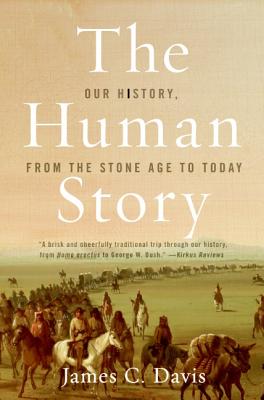The Human Story: Our History, from the Stone Age to Today

The Human Story: Our History, from the Stone Age to Today
Has there ever been a history of the world as readable as this?
In The Human Story, James C. Davis takes us on a journey to ancient times, telling how peoples of the world settled down and founded cities, conquered neighbors, and established religions, and continues over the course of history, when they fought two nearly global wars and journeyed into space.
Davis's account is swift and clear, never dull or dry. He lightens it with pungent anecdotes and witty quotes. Although this compact volume may not be hard to pick up, it's definitely hard to put down.
For example, on the death of Alexander the Great, who in a decade had never lost a single battle, and who had staked out an empire that spanned the entire Near East and Egypt, Davis writes: "When they heard how ill he was, the king's devoted troops insisted on seeing him. He couldn't speak, but as his soldiers -- every one -- filed by in silence, Alexander's eyes uttered his farewells. He died in June 323 B.C., at the ripe old age of thirty-two."
In similar fashion Davis recounts Russia's triumph in the space race as it happened on an autumn night in 1957: "A bugle sounded, flames erupted, and with a roar like rolling thunder, Russia's rocket lifted off. It bore aloft the earth's first artificial satellite, a shiny sphere the size of a basketball. Its name was Sputnik, meaning 'companion' or 'fellow traveler' (through space). The watchers shouted, 'Off. She's off. Our baby's off!' Some danced; others kissed and waved their arms."
Though we live in an age of many doubts, James C. Davis thinks we humans are advancing. As The Human Story ends, he concludes, "The world's still cruel; that's understood, / But once was worse. So far so good."
PRP: 156.98 Lei
Acesta este Prețul Recomandat de Producător. Prețul de vânzare al produsului este afișat mai jos.
141.28Lei
141.28Lei
156.98 LeiLivrare in 2-4 saptamani
Descrierea produsului
Has there ever been a history of the world as readable as this?
In The Human Story, James C. Davis takes us on a journey to ancient times, telling how peoples of the world settled down and founded cities, conquered neighbors, and established religions, and continues over the course of history, when they fought two nearly global wars and journeyed into space.
Davis's account is swift and clear, never dull or dry. He lightens it with pungent anecdotes and witty quotes. Although this compact volume may not be hard to pick up, it's definitely hard to put down.
For example, on the death of Alexander the Great, who in a decade had never lost a single battle, and who had staked out an empire that spanned the entire Near East and Egypt, Davis writes: "When they heard how ill he was, the king's devoted troops insisted on seeing him. He couldn't speak, but as his soldiers -- every one -- filed by in silence, Alexander's eyes uttered his farewells. He died in June 323 B.C., at the ripe old age of thirty-two."
In similar fashion Davis recounts Russia's triumph in the space race as it happened on an autumn night in 1957: "A bugle sounded, flames erupted, and with a roar like rolling thunder, Russia's rocket lifted off. It bore aloft the earth's first artificial satellite, a shiny sphere the size of a basketball. Its name was Sputnik, meaning 'companion' or 'fellow traveler' (through space). The watchers shouted, 'Off. She's off. Our baby's off!' Some danced; others kissed and waved their arms."
Though we live in an age of many doubts, James C. Davis thinks we humans are advancing. As The Human Story ends, he concludes, "The world's still cruel; that's understood, / But once was worse. So far so good."
Detaliile produsului











